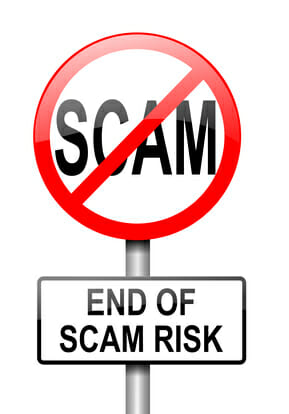
I love the holidays. They are truly my favorite time of the year. That’s why it pains me to say that not only is the holiday season a time for joy, generosity, and celebration—but it’s also a prime time for scammers to strike. To help you stay safe, here are what I call The 12 Scams of Christmas. Let’s unwrap these holiday hazards and learn how to avoid them.
#1 Fake Charity Appeals
Scammers often impersonate reputable charities or create fake ones to take advantage of your holiday generosity. They may send emails, call you, or even knock on your door.
Scam Tip #1: Research charities at websites like Charity Navigator before donating.
Scam Tip #2: Avoid donating through links or over the phone unless you were the one who contacted the charity.
#2 Holiday Phishing Emails or Texts
Beware of emails claiming you’ve won a prize, received a gift card, or need to verify a purchase. These phishing emails often contain malicious links.
Scam Tip #3: Hover your mouse over links before you click. Your browser should show the URL Only click if it looks legitimate.
Scam Tip #4: Only log in to accounts directly through official websites or apps. Don’t use a login link unless you know where the email containing the link came from.
#3 Online Shopping Scams
Fake websites may pop up offering steep discounts on popular holiday items. You pay, but the item never arrives—or you receive counterfeit goods.
Scam Tip #5: Check the website URL for signs of fraud (e.g., misspellings or “http” instead of “https”). Scammers can clone websites easily these days, so you must rely on a trusted link or reading the URL carefully.
Scam Tip #6: Look for online reviews or a lack of contact information as red flags. If you see no reviews or a ton of them that all look the same, be suspicious.
#4 Porch Pirates and Delivery Scams
Porch pirates swipe packages off doorsteps, while scammers send fake delivery failure notices with malicious links.
Scam Tip #7: Track packages closely and use delivery lockers when available. If you’ll be gone when a package is due to arrive, arrange for a friend to pick it up or have it delivered to a locker for the best security.
Scam Tip #8: Fake delivery notifications are popping up everywhere. Watch out for the ‘we couldn’t deliver’ texts and emails. Never click on delivery notification links—visit the carrier’s website directly.
#5 Gift Card Scams
Scammers may tamper with gift cards by scratching off PIN codes in the store. If you buy a gift card that’s been tampered with, the scammer will drain the card before you can use it. Another alternative is that scammers may pressure you to pay fake debts with gift cards. In this case, you have no recourse to get a refund.
Scam Tip #9: Inspect gift cards for tampering before you buy them. Check to make sure the PIN for the card is not visible. If it is, report it to a store employee.
Scam Tip #10: No legitimate company demands payment in gift cards.
# 6 Social Media Secret Santa
Have you ever taken part in a Secret Santa gift exchange? This is a great holiday gift exchange for in-person parties, but the online version is often a pyramid scheme where participants send gifts or money and rarely receive anything in return.
Scam Tip #11: Stick to gift exchanges with people you know and trust. They’re fun, and the only surprise you’ll get is the gift.
Scam Tip #12: Be wary of social media invitations from strangers. Before you click to connect with a new social media friend, check their profile.

#7 Fake Travel Deals
Do you like getting away for the holidays? If so, watch out for this one. Scammers create enticing travel packages for vacations that don’t exist or require upfront payments to secure a deal.
Scam Tip #13: Book travel through reputable companies or directly with airlines and hotels.
Scam Tip #14: Be cautious of deals that seem too good to be true.
#8 E-Cards with Malware
Digital greeting cards may seem festive, but some may come embedded with malware designed to steal your data.
Scam Tip #15: If you receive an e-card, only open it if it comes from a trusted source. This can be tough if you don’t know much about e-cards, but try doing an online search for ‘reputable e-card companies.’ The search results should show a listing of some companies you can trust.
Scam Tip #16: Whether you’re sending or receiving an e-card, be cautious of links requiring you to download additional software.
#9 Temporary Holiday Job Scams
Fake job postings target seasonal workers, asking for personal details or upfront fees for training materials. Also, be wary of companies that pressure you to make a quick decision about accepting their offer.
Scam Tip #17: Research companies and job postings thoroughly. Check the company’s website and trusted job boards like Indeed or the Better Business Bureau.
Scam Tip #18: Remember that legitimate employers will never ask for payment to apply or to be trained for a job.
#10 Charity Gift Scams
Charity scams are huge during the holidays. Scammers kick their operations into high gear to create fake donation opportunities or sell holiday cards, decorations, or other items under the guise of supporting a cause. Unfortunately, the proceeds don’t go to charity.
Scam Tip #19: Verify the organization before purchasing items. As I mentioned above, check out the organization by using a source such as Charity Navigator.
Scam Tip #20: Look for transparency about where your money goes. Read the fine print and/or check the company’s website.
#11 Fraudulent Holiday Contests and Giveaways
“Congratulations! You’ve won a prize!”—except it’s a fake. These contests often request sensitive information or upfront fees.
Scam Tip #21: Be skeptical of contests you didn’t enter.
Scam Tip #22: Legitimate contests won’t ask for payment to claim a prize. Of course, if you do win a prize in a legitimate contest, you’ll have to pay taxes, but you’ll deal with the IRS on that, not the person who claims you won a contest you didn’t enter!
#12 Bogus Pet Adoption Ads
There are all kinds of reasons to adopt a pet during the holidays. The problem is, scammers know all those reasons and love to exploit the emotional pull of getting a furry friend. Once they’ve got you hooked with heartwarming photos, they’ll demand payment for pets that don’t exist.
Scam Tip #23: Work with local shelters or reputable breeders.
Scam Tip #24: Never pay upfront for a pet without meeting it in person. Fido might look cute on the screen, but he might be vicious—or not exist at all. Save the emotional attachment until after you’re convinced your dealing with a legitimate source.
How to Stay Safe This Holiday Season
There you have it — 24 tips to avoid the 12 Scams of Christmas. Here are three bonus tips to help keep your holidays merry and bright:
#1: Verify sources before sharing personal or financial information.
#2 Monitor your accounts for unusual activity.
#3 Educate yourself and loved ones about these scams.
By staying vigilant, you can enjoy a safe and scam-free holiday season! Whatever holiday you’re celebrating this season, I hope you have fun! Happy Holidays!
Want more scam tips? Check out my full listing here. And, if you like stories about amazing places, you’ll love my Friday Morning Post. See all my Friday Morning Posts here.


Awesome tips – thank you so much, Terry!